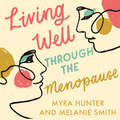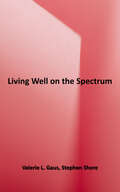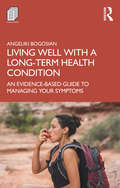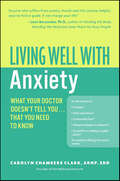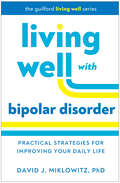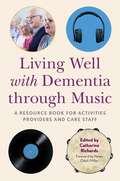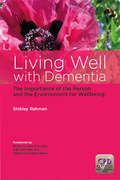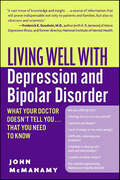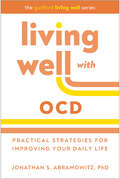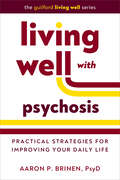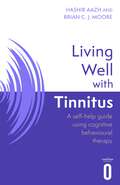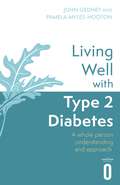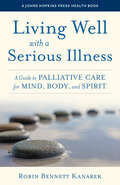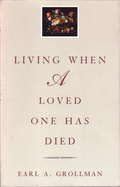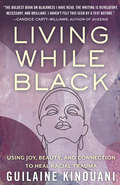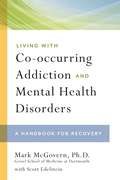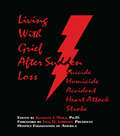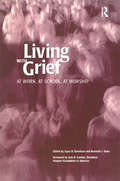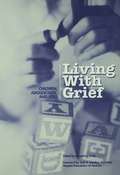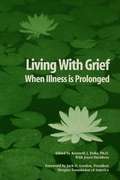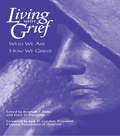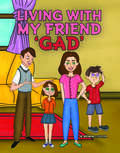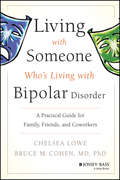- Table View
- List View
Living Well Through The Menopause: An evidence-based cognitive behavioural guide (Living Well)
by Melanie Smith Myra HunterAn essential book to help women to live well through the menopause and to cope effectively with menopausal symptoms, using a cognitive behavioural therapy (CBT) approach.Living Well Through the Menopause is based on a wealth of research, including randomised controlled trials of the MENOS intervention with over 1000 women, that has demonstrated the effectiveness of this approach specifically for menopausal symptoms - hot flushes, night sweats and also their impact on daily life. CBT is proven as an effective alternative for women who do not want or are unable to use hormone therapy (HT).Written in an accessible and interactive style, with case examples and quotes, this guide will empower you and, specifically:· Help you to understand and cope with your physical and emotional reactions to the menopause· Clarify your key goals, thoughts and feelings using interactive questions and homework sheets· Enhance your self-care through behaviour change· Help partners and loved ones to support you through the menopauseLiving Well self-help guides use clinically proven techniques to treat long-standing and disabling conditions, both psychological and physical.Series Editors: Professor Kate Harvey and Emeritus Professor Peter Cooper
Living Well on the Spectrum: How to Use Your Strengths to Meet the Challenges of Asperger Syndrome/High-functioning Autism
by Valerie L. GausNavigating the "neurotypical" world with Asperger syndrome or high-functioning autism (AS/HFA) can be extremely stressful. But by understanding the specific ways your brain works differently--and how to tap into your personal strengths--you can greatly enhance your well-being. <p><p>In this wise and practical book, experienced therapist Valerie L. Gaus helps you identify goals that will make your life better and take concrete steps to achieve them. Grounded in psychological science, the techniques in this book help you: *Learn the unspoken rules of social situations. *Improve your communication skills. *Get organized at home and at work. *Manage anxiety and depression. *Strengthen your relationships with family and friends. *Live more successfully on your own or with others. <p><p>A wealth of stories, questionnaires, worksheets, and concrete examples help you find personalized solutions to problems you are likely to encounter. You can download and print additional copies of the worksheets for repeated use. Of special note, the Introduction was updated in 2017 with the latest information on how autism spectrum disorder is defined in DSM-5. Finally, a compassionate, knowledgeable, positive guide to living well on the spectrum. Mental health professionals, see also the author's Cognitive-Behavioral Therapy for Adults with Autism Spectrum Disorder, Second Edition.
Living Well with A Long-Term Health Condition: An Evidence-Based Guide to Managing Your Symptoms
by Angeliki BogosianLiving well with a long-term health condition is one of the most challenging experiences one can have. Written based on the most recent research evidence, this straightforward guide to managing both the emotional and physical aspects of chronic illness gives practical suggestions of how those living with a range of conditions can most effectively manage their symptoms whilst still living an active and fulfilling life. Covering a range of topics including self-management of pain, fatigue, stress and lifestyle changes, and adapting to a diagnosis, the book provides an accessible resource that will enable patients and carers to better understand and meet the psychological challenges of long-term condition. By taking a holistic approach, Bogosian empowers the individual to identify their own goals and the pathways to achieve them to reach personal satisfaction, while negotiating the complexities of their condition. This book will be an indispensable guide to those living with a long-term illness, as well as their family members. It will also be of interest to specialist nurses, care consultants, or social workers working with people with a chronic illness.
Living Well with Anxiety: What Your Doctor Doesn't Tell You . . . That You Need to Know (Living Well)
by Carolyn Chambers ClarkA complete guide to the side-effects and treatments for anxiety disordersHigh anxiety is an unfortunate byproduct of this world, and for approximately 20 million American adults a year, anxiety becomes a debilitating part of their lives. The psychological can become physical, causing dizziness, stammering, heart palpitations, trembling, shaking, and other symptoms. Unlike other books on anxiety disorders, Living Well with Anxiety offers a holistic approach to minimizing anxiety, presenting both conventional psychiatric and psychological approaches to anxiety conditions, as well as patient anecdotes, and nutrition, herbal, environmental, exercise and other healing measures to combat this disorder. Living Well with Anxiety contains helpful advice for a wide range of anxiety disorders, including social anxiety disorder, panic disorder, obsessive compulsive disorder and various phobias that cause anxiety. With a comprehensive resource section that contains websites, doctors, and helpful articles, this book, like all of the titles in the successful Living Well series, offers positive and far-reaching solutions to building a healthier life, both emotionally and physically.
Living Well with Bipolar Disorder: Practical Strategies for Improving Your Daily Life (Guilford Living Well Series)
by David J. MiklowitzWhat does it take to achieve a successful career, healthy habits, and fulfilling relationships--even with bipolar disorder (BD)? What common stressors do you need to look out for, and how can you cope with them? No one is better suited to provide people with BD with practical problem-solving help than leading expert David J. Miklowitz. From managing mood swings to dealing with anxiety, getting enough sleep, defusing family conflicts, and troubleshooting medications, this book offers keys to effective self-care. Short, clearly formatted chapters with downloadable practical tools help you tackle challenges as they arise and plan for trouble spots that lie ahead. With Dr. Miklowitz's empowering guidance, navigate your own unique path to living well.
Living Well with Dementia through Music: A Resource Book for Activities Providers and Care Staff
by Sarah Metcalfe Nigel Marshall Ruth Melhuish Alison Acton Clare Barone Arash Bazrafshan Melanie Burton Evan Dawson Melissa Elliott Maggie Grady Tobias Kaye Nicola Jacobson-Wright Harriet Powell Trish Vella-Burrows Ian SpinkMusic is an essential tool in dementia care. This accessible guide embraces ways in which music can enhance the daily lives of those with dementia. It draws on the expertise of practitioners regularly working in dementia settings, as well as incorporating research on people with dementia, to help anyone, whether or not they have any musical skills or experience, to successfully use music in dementia care.Guiding the reader through accessible activities with singing, percussion, sounding bowls and other musical tools, the book shows how music may can be used from the early to late stages of dementia. This creative outlet can extend to inspire dance, movement, poetry and imagery. The chapters include creative uses of technology, such as tablets and personal playlists.The book also covers general considerations for using music with people living with dementia in institutional settings, including evaluating and recording outcomes.Living Well with Dementia through Music is the perfect go-to guide for music-based activities with people living with dementia.
Living Well with Dementia: The Importance of the Person and the Environment for Wellbeing
by Shibley RahmanThis unique guide provides a much needed overview of dementia care. With a strong focus on the importance of patients and families, it explores the multifaceted meaning behind patient wellbeing and its vital significance in the context of national policy.Adopting a positive, evidence-based approach, the book dispels the bleak outlook on dementia ma
Living Well with Depression and Bipolar Disorder: What Your Doctor Doesn't Tell You . . . That You Need to Know
by John McManamySeven years ago, John McManamy was diagnosed with bipolar disorder. Through his successful Web site and newsletter, he has turned his struggles into a lifelong dedication to helping others battling depression and bipolar disorder reclaim their lives. In Living Well with Depression and Bipolar Disorder, he brilliantly blends the knowledge of leading expert authorities with the experiences of his fellow patients, as well as his own, and offers extensive information on:Diagnosing the problemAssociated illnesses and symptomsTreatments, lifestyle, and copingThe effects of depression and bipolar disorder on relationships and sexWith a compassionate and eloquent voice, McManamy describes his belief that depression is a wide spectrum that reaches from occasional bouts of depression to full-fledged bipolar disorder. The first book to help patients recognize this diversity of the disorder, Living Well with Depression and Bipolar Disorder will help sufferers begin to reclaim their lives.
Living Well with OCD: Practical Strategies for Improving Your Daily Life (Guilford Living Well Series)
by Jonathan S. AbramowitzOver decades, noted authority Jonathan S. Abramowitz has helped thousands of people use the best science-based strategies to overcome obsessive–compulsive disorder (OCD). But if you have OCD--whether in treatment or not--you know that some days are harder than others. If you are looking for empathic support to navigate the rough patches when OCD disrupts your life, this book is for you! Get step-by-step ideas and downloadable practical tools for coping with lingering obsessional thoughts and doubts, riding out compulsive urges, and staying on track at work or in school. Dr. Abramowitz offers tips for navigating relationships and solving problems with family members, friends, and romantic partners. In short, engaging chapters, this book helps you cultivate resilience, replace self-criticism with self-compassion, and build the life you want--even with OCD.
Living Well with Psychosis: Practical Strategies for Improving Your Daily Life (The Guilford Living Well Series)
by Aaron P. BrinenFor people with psychosis, recovery is a winding path, not a straight line. And the best person to steer your recovery is you. Leading psychologist Aaron P. Brinen busts myths and helps you build the life you want in this empowering book. Dr. Brinen provides step-by-step guidance for becoming a strong self-advocate, navigating treatment options, managing symptoms that cause distress, and coping with stigma. Learn crucial ways to connect with others, pursue your goals at school or work, and keep your body healthy. The brief chapters are warm and compassionate, with downloadable practical tools designed to boost your energy and motivation for getting out into the world. This is a book you can read cover to cover--or dip into any time you need extra support to live well and feel good.
Living Well with Tinnitus: A self-help guide using cognitive behavioural therapy (Living Well #1)
by Brian C.J. Moore Hashir Aazh'With real life examples to guide the reader and proven cognitive behavioural techniques, this will help people to overcome the distress associated with tinnitus and live a meaningful life'Dr Rory Allott, Greater Manchester NHS Foundation TrustWorldwide, about one billion people experience tinnitus at some point in their life. It is a life-changing experience for many of them. Learning effective management strategies in a timely fashion is the key to dealing with this difficult condition.This book combines cutting-edge knowledge of auditory science and theoretical frameworks in modern psychology with insight and real-life, human examples from clinical practice. Packed with metaphors and practical tips, the authors aid understanding of complex concepts by introducing an accessible and entertaining cast of characters from history and fiction, from Beauty and the Beast to Moby Dick, from Dante to Muhammad Ali, and from Sigmund Freud to Rumi.By following the advice in this book, you will:· Gain a realistic picture of what the recovery from tinnitus-related distress looks like· Learn how to go beyond the difficulties and annoyance caused by tinnitus and pay attention to the meanings behind those experiences· Develop skills that are proven to help on your journey.Everything that you need to know about living well with tinnitus is presented in ten steps!Living Well self-help guides use clinically proven techniques to treat long-standing and disabling conditions, both psychological and physical.Series Editors: Professor Kate Harvey and Emeritus Professor Peter Cooper
Living Well with Tinnitus: A self-help guide using cognitive behavioural therapy (Living Well #1)
by Brian C.J. Moore Hashir Aazh'With real life examples to guide the reader and proven cognitive behavioural techniques, this will help people to overcome the distress associated with tinnitus and live a meaningful life'Dr Rory Allott, Greater Manchester NHS Foundation TrustWorldwide, about one billion people experience tinnitus at some point in their life. It is a life-changing experience for many of them. Learning effective management strategies in a timely fashion is the key to dealing with this difficult condition.This book combines cutting-edge knowledge of auditory science and theoretical frameworks in modern psychology with insight and real-life, human examples from clinical practice. Packed with metaphors and practical tips, the authors aid understanding of complex concepts by introducing an accessible and entertaining cast of characters from history and fiction, from Beauty and the Beast to Moby Dick, from Dante to Muhammad Ali, and from Sigmund Freud to Rumi.By following the advice in this book, you will:· Gain a realistic picture of what the recovery from tinnitus-related distress looks like· Learn how to go beyond the difficulties and annoyance caused by tinnitus and pay attention to the meanings behind those experiences· Develop skills that are proven to help on your journey.Everything that you need to know about living well with tinnitus is presented in ten steps!Living Well self-help guides use clinically proven techniques to treat long-standing and disabling conditions, both psychological and physical.Series Editors: Professor Kate Harvey and Emeritus Professor Peter Cooper
Living Well with Type 2 Diabetes: A Whole Person Understanding and Approach (Living Well)
by Pamela Myles-Hooton Dr John GedneyA practical, self-help guide for living well with Type 2 Diabetes (T2D) In the last forty years, we have seen an astounding rise in the prevalence of T2D in most countries. There are thought to be close to half a billion people affected worldwide. Traditionally thought of as a disease of mid-life and old age, both T2D and the metabolic markers of future disease are now increasingly being seen in young people, children and even infants. The burden of this disease is huge at all levels − for healthcare spend and for added risk of other medical problems. Other than its physical impacts, more than a third of people with T2D are said to experience psychological problems related specifically to the condition. We are now at a crossroads in understanding the science behind T2D with a more focused approach emerging. Research and practice are challenging the traditional way in which we approach and manage T2D − as well as better understanding how to prevent it altogether. By following the advice in this book, you will: · Better understand and be empowered to control your metabolic health · Learn how to prevent, reverse, or improve, and better manage your T2D Living Well self-help guides use clinically proven techniques to treat long-standing and disabling conditions, both psychological and physical.
Living Well with Type 2 Diabetes: A Whole Person Understanding and Approach (Living Well)
by Pamela Myles-Hooton Dr John GedneyA practical, self-help guide for living well with Type 2 Diabetes (T2D) In the last forty years, we have seen an astounding rise in the prevalence of T2D in most countries. There are thought to be close to half a billion people affected worldwide. Traditionally thought of as a disease of mid-life and old age, both T2D and the metabolic markers of future disease are now increasingly being seen in young people, children and even infants. The burden of this disease is huge at all levels − for healthcare spend and for added risk of other medical problems. Other than its physical impacts, more than a third of people with T2D are said to experience psychological problems related specifically to the condition. We are now at a crossroads in understanding the science behind T2D with a more focused approach emerging. Research and practice are challenging the traditional way in which we approach and manage T2D − as well as better understanding how to prevent it altogether. By following the advice in this book, you will: · Better understand and be empowered to control your metabolic health · Learn how to prevent, reverse, or improve, and better manage your T2D Living Well self-help guides use clinically proven techniques to treat long-standing and disabling conditions, both psychological and physical.
Living Well with a Serious Illness: A Guide to Palliative Care for Mind, Body, and Spirit (A Johns Hopkins Press Health Book)
by Robin Bennett KanarekA practical guide for understanding how palliative care can improve quality of life for patients and their caregivers.Robin Bennett Kanarek was a registered nurse working with patients suffering from chronic medical conditions when her ten-year-old son was diagnosed with leukemia. As her son endured grueling treatments, Robin realized how often medical professionals overlook critical psychological, emotional, and spiritual support for people with life-threatening illnesses. Living Well with a Serious Illness is the culmination of decades of Robin's work to advance the field of palliative care.Although palliative care is often associated with hospice and end-of-life planning, Kanarek argues for a more expanded definition that incorporates palliative care earlier in patients' journeys. Living Well with a Serious Illness helps patients and their caregivers understand• what palliative care entails• how to access the support they need when going through a serious illness• what questions to ask medical professionals • how to navigate advanced care planning• definitions of common terminology used with end-of-life planning• the importance of spiritual care, coping strategies, and emotional support• how to become an advocate for palliative careThis book illuminates the importance of seeing patients as individuals who can benefit from care for their body, mind, and spirit—the core tenet of palliative care.
Living When a Loved One Has Died
by Earl A. GrollmanWhen someone you love dies, Earl Grollman writes, "there is no way to predict how you will feel. The reactions of grief are not like recipes, with given ingredients, and certain results. . . . Grief is universal. At the same time it is extremely personal. Heal in your own way."If someone you know is grieving, Living When a Loved One Has Died can help. Earl Grollman explains what emotions to expect when mourning, what pitfalls to avoid, and how to work through feelings of loss. Suitable for pocket or bedside, this gentle book guides the lonely and suffering as they move through the many facets of grief, begin to heal, and slowly build new lives.
Living While Black: Using Joy, Beauty, and Connection to Heal Racial Trauma
by Guilaine KinouaniA powerful look at the impacts of anti-Black racism and a practical guide for overcoming racial trauma through radical self-care as a form of resistanceOver the past 15 years, radical psychologist Guilaine Kinouani has focused her research, writing, and workshops on how racism affects both physical and mental health. Living While Black gives voice to the diverse, global experiences of Black people, using personal stories, powerful case studies, and eye-opening research to offer expert guidance on how to set boundaries and process micro-aggressions; protect children from racism; handle difficult race-based conversations; navigate the complexities of Black love; and identify and celebrate the wins. Based on her findings, Kinouani has devised tried-and-tested strategies to help protect Black people from the harmful effects of verbal, physical, and structural racism. She empowers Black readers to adopt self-care mechanisms to improve their day-to-day wellness to help them thrive, not just survive, and to find hope and beauty—or even joy—in the face of racial adversity. She also provides a vital resource for allies seeking to better understand the impacts of racism and how they can help. With the rise of far-right ideologies and the increase of racist hate crimes, Living While Black is both timely and instrumental in moving conversations from defining racism for non-Black majorities to focusing on healing and nurturing the mental health of those facing prejudice, discrimination, and the lasting effects of the violence of white supremacy.
Living With Co-occurring Addiction And Mental Health Disorders: A Handbook For Recovery
by Scott Edelstein Mark McGovernAbout eleven million people in North America have a substance use disorder and at least one other mental health disorder. Those who struggle with this combination may be faced with a powerful recipe for destruction, especially self-destruction. The good news is that there is help. This handbook draws from an evidence-based program by a team at the Geisel School of Medicine at Dartmouth, internationally-recognized pioneers in the integrated treatment of co-occurring disorders. Co-occurring Addiction and Mental Health Disorders is designed to inform and empower those with such "dual disorders". Author Mark McGovern shows how they can make informed choices about their own treatment and, together with a trained clinician, shape a program that works. Key topics include: getting an assessment; reviewing treatment options; selecting the right treatment team; setting achievable goals and making positive changes with cognitive-behavioral therapy; building a support network of family and friends; and connecting with others recovering from co-occurring disorders. Informative, thorough, and easy to follow, this book has helped many people with co-occurring disorders thrive and be their own best recovery advocates.
Living With Grief: After Sudden Loss Suicide, Homicide, Accident, Heart Attack, Stroke
by Kenneth J. DokaFirst published in 1996. Routledge is an imprint of Taylor & Francis, an informa company.
Living With Grief: At Work, At School, At Worship
by Kenneth J. DokaWhile we often discuss how we grieve, rarely do we consider the places where we grieve. Yet whether at work, at school, at worship or at home, grief not only affects our moods and motivation but our ability to function and our relationships as well. This book considers the ways that grief influences us in varied settings, offering humane and practical suggestions to organizations such as workplaces, schools or places of worship as to how they can assist grievers in their midst struggling with illness and loss. First published in 1999. Routledge is an imprint of Taylor & Francis, an informa company.
Living With Grief: Children, Adolescents and Loss
by Kenneth J. DokaLiving With Grief: Children, Adolescents, and Loss, (2000) edited by Kenneth J. Doka, features articles by leading educators and clinicians in the field of grief and bereavement. The chapters entitled "Voices" are the writings of children and adolescents. The book includes a comprehensive resource list of national organizations and a useful bibliography of age-appropriate literature for children and adolescents.
Living With Grief: When Illness is Prolonged
by Kenneth J. Doka Joyce DavidsonFirst published in 1997. Routledge is an imprint of Taylor & Francis, an informa company.
Living With Grief: Who We Are How We Grieve
by Kenneth J. Doka Joyce D. DavidsonProduced as a companion to the Hospice Foundation of America's fifth annual National Bereavement Teleconference, this volume examines how key aspects of identity affect how individuals grieve. Variables explored include culture, spirituality, age and development level, class and gender.
Living With My Friend 'GAD'
by Dr Brendan CoulsonEmpower young readers with tools to navigate Generalised Anxiety Disorder (GAD) through this enchanting tale. With captivating illustrations and relatable prose, we follow Poppy and her unique imaginary friend, GAD. As Poppy learns to cope with her anxiety, she’s aided by her loving parents, the wise Mr. Purple, and the enchanting Miss Sparkle. This story reassures children that they’re not alone in their struggles and introduces them to transformative strategies. With GAD as a potential superpower, the techniques shared by Miss Sparkle can be embraced by parents and caregivers to further support their child’s journey. A portion of the proceeds of this book are donated to Young Minds to support their vision for change, and to ensure that no young person feels alone with their mental health. To find out more visit: www.youngminds.org.uk [https://www.youngminds.org.uk/ ]
Living With Someone Who's Living With Bipolar Disorder
by Cohen Chelsea Lowe Bruce M.An essential resource for anyone who has a close relationship with a person who is bipolar This book provides a much-needed resource for family and friends of the more than 5 million American adults suffering from bipolar disorder. From psychotic behavior that requires medication to milder mood swings with disturbing ups and down, this book offers a warm and often humorous user-friend guide for coping with bipolar loved ones, colleagues, and friends. The book includes Guidance for identifying bipolar disorder symptoms and how to get the diagnosis confirmed Strategies for dealing with rants, attacks, blame, depression, mania and other behaviors Crucial information on medication and its effectiveness and potential side-effects Techniques for dealing with attempts to self-medicate with drugs and alcohol How many people with bipolar disorders can care for themselves, get help, feel supported and go on with their own lives This important book contains real-life illustrative examples and a wealth of helpful strategies and coping mechanisms that can be put into action immediately.
